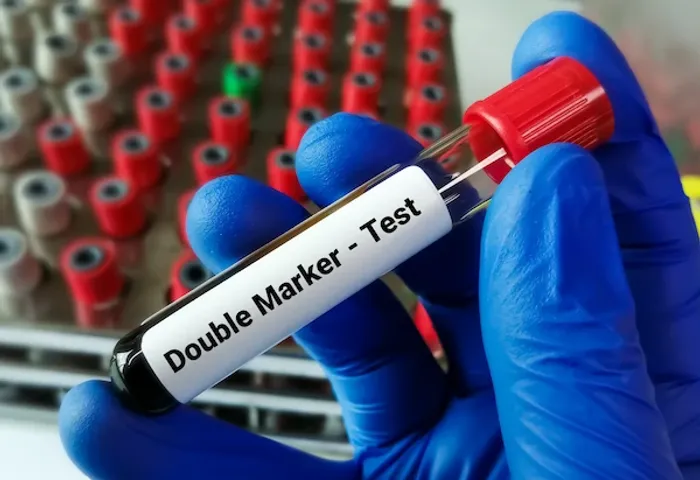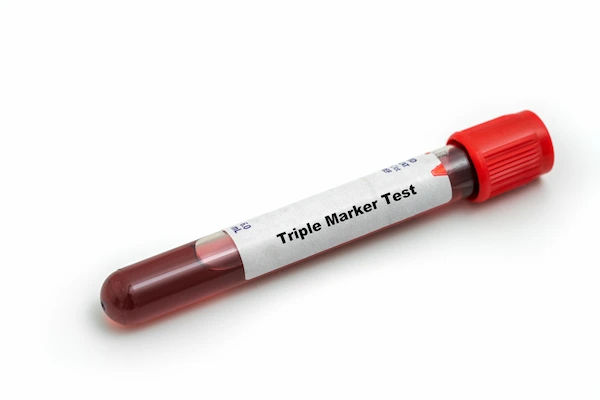Double Marker Test Overview and Insights
Learn about the Double Marker Test, a prenatal screening used to assess the risk of chromosomal abnormalities in a fetus, such as Down syndrome and Edwards syndrome. Get insights into the test's procedure, accuracy, and what the results mean.

Written by Dr. Dhankecha Mayank Dineshbhai
Reviewed by Dr. Vasanthasree Nair MBBS
Last updated on 29th Aug, 2025

Introduction
Pregnancy is a beautiful journey, but it also comes with its share of concerns, especially about the baby’s health. One of the tests that can help assess the risk of certain genetic conditions in the baby is the Double Marker Test. If you're an expectant mother or know someone who is, this article will help you understand what this test is, why it’s important, and what to expect.
What is a Double Marker Test?
The Double Marker Test is a prenatal screening test performed during the first trimester of pregnancy (between 11 to 14 weeks). It helps assess the risk of chromosomal abnormalities, such as Down syndrome (Trisomy 21) and Edwards syndrome (Trisomy 18), in the developing baby.
This test is noninvasive, meaning it only requires a blood sample from the mother and does not pose any risk to the baby.
Why is the Double Marker Test Done?
The main purpose of this test is to identify potential genetic disorders early so that further diagnostic tests (if needed) can be planned. Some key reasons why doctors recommend it include:
- Maternal Age – Women aged 35 and above have a higher risk of chromosomal abnormalities.
- Family History – If there’s a history of genetic disorders in the family.
- Previous Pregnancy Issues – If a previous pregnancy had chromosomal abnormalities.
- Early Risk Assessment – Helps parents and doctors make informed decisions about further testing.
What Does the Double Marker Test Measure?
The test measures two key substances in the mother’s blood:
1. Pregnancy-Associated Plasma Protein-A (PAPPA) – Low levels may indicate a higher risk of chromosomal disorders.
2. Human Chorionic Gonadotropin (hCG) – Abnormal levels (either too high or too low) can also suggest potential issues.
These results are combined with an ultrasound scan (Nuchal Translucency Scan) to provide a risk score for genetic conditions.
Understanding the Results
The test does not confirm a genetic disorder but estimates the risk. Results are usually given as:
- Low Risk – The chance of chromosomal abnormalities is low.
- High Risk – Further diagnostic tests (like amniocentesis or CVS) may be recommended.
Important Note: A high risk result does not mean the baby definitely has a disorder—only that more testing is needed.
Get Your Test Done.
Who Should Get a Double Marker Test?
While it is optional, doctors often recommend it for:
Women over 35 years
- Those with a family history of genetic disorders
- Women who had previous pregnancies with chromosomal issues
- Anyone who wants early reassurance about their baby’s health
How to Prepare for the Test?
Ways to prepare for the test include:
- No special preparation is needed.
- You can eat and drink normally before the test.
- Wear comfortable clothing for the blood draw.
What If the Results Are High Risk?
If your test indicates a higher risk, don’t panic. Your doctor may suggest:
- NIPT (NonInvasive Prenatal Testing) – A more advanced blood test.
- Amniocentesis – A diagnostic test where a small amount of amniotic fluid is tested.
- Chorionic Villus Sampling (CVS) – Another diagnostic test involving placental tissue.
These tests provide more definitive answers but carry a small risk of miscarriage, so they are only done if necessary.
Consult a General Physician
Benefits of the Double Marker Test
- Early Detection – Helps identify risks in the first trimester.
- NonInvasive – Only a blood test, no risk to the baby.
- Helps in DecisionMaking – Allows parents to prepare or seek further testing if needed.
Limitations of the Test
- It is not a diagnostic test—only a screening tool.
- False positives or negatives can occur.
- Further tests may be needed for confirmation.
Final Thoughts
The Double Marker Test is a safe and useful screening tool that helps expectant mothers assess their baby’s risk of genetic conditions early in pregnancy. While it doesn’t provide a definitive diagnosis, it helps guide further testing if needed.
If you’re pregnant and considering this test, consult your doctor to understand if it’s right for you.
Need Help? Schedule a Test Today!
If you’re looking to book a Double Marker Test, Apollo 24|7 makes it easy! You can schedule an appointment online and get tested at your convenience.
Call us or book online today for expert guidance and care.
Stay informed, stay healthy!
Would you like more details on pregnancy care or other prenatal tests? Let us know in the comments!
Consult a General Physician
Consult a General Physician

Dr. Shesham Srinidhi
General Practitioner
5 Years • MD(physician)
Hyderabad
Apollo 24|7 Clinic, Hyderabad
(150+ Patients)

Dr. Siri Nallapu
General Practitioner
5 Years • MBBS
Hyderabad
Apollo 24|7 Clinic, Hyderabad

Dr. Shaik Abdul Kalam
General Practitioner
3 Years • MD (Physician)
Visakhapatnam
Apollo 24|7 Clinic - Andhra Pradesh, Visakhapatnam
(150+ Patients)

Dr. J T Hema Pratima
General Practitioner
9 Years • MBBS
Chennai
Apollo 24|7 Clinic - Tamilnadu, Chennai
(325+ Patients)

Dr. Jawwad Mohammed Kaleem
General Practitioner
4 Years • MBBS
Hyderabad
Apollo 24|7 Clinic, Hyderabad
Consult a General Physician

Dr. Shesham Srinidhi
General Practitioner
5 Years • MD(physician)
Hyderabad
Apollo 24|7 Clinic, Hyderabad
(150+ Patients)

Dr. Siri Nallapu
General Practitioner
5 Years • MBBS
Hyderabad
Apollo 24|7 Clinic, Hyderabad

Dr. Shaik Abdul Kalam
General Practitioner
3 Years • MD (Physician)
Visakhapatnam
Apollo 24|7 Clinic - Andhra Pradesh, Visakhapatnam
(150+ Patients)

Dr. J T Hema Pratima
General Practitioner
9 Years • MBBS
Chennai
Apollo 24|7 Clinic - Tamilnadu, Chennai
(325+ Patients)

Dr. Jawwad Mohammed Kaleem
General Practitioner
4 Years • MBBS
Hyderabad
Apollo 24|7 Clinic, Hyderabad



